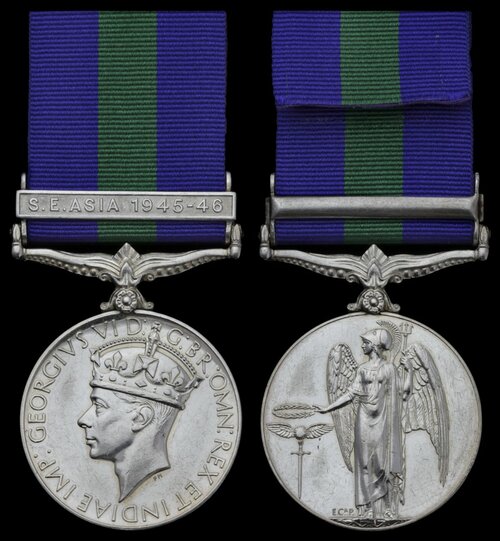
Auction: 22001 - Orders, Decorations and Medals
Lot: 124
General Service 1918-62, 1 clasp, S. E. Asia 1945-46 (5432155 P/L/Nk. Subitman Gurung, 3/5 R.G.R.), very fine
Following the surrender of Japan on 15th August 1945, the 3rd Battalion 5th Royal Gurkha Rifles (3-5RGR) took part in Operation ZIPPER - the re-occupation of Malaya - in September 1945. It remained in Malaya for one month disarming Japanese troops and undertaking patrols and flag marches before moving to Java in October 1945.
On arrival, 3-5RGR spent the first six months in Bandoeng, a hill station in eastern Java, where it held several parades to disarm Japanese troops and undertook intensive patrolling to protect some 50,000 Allied Prisoners of War and Internees (RAPWI), mostly Dutch and Eurasian, against the growing violence against them by Indonesian militants who were campaigning for "Merdeka" - their freedom. The first attack against the Battalion occurred in November 1945, when a Gurkha sentry was attacked and wounded by armed Indonesians. Thereafter, attacks against the Battalion became more frequent and violent as they sought to intervene between the Dutch and Indonesians and maintain a semblance of law and order. The Indonesians displayed extreme fanaticism in pressing home their attacks and often suffered heavy casualties before being beaten back. Like all units of the Indian Army, the 3rd Battalion was also subject to increasing nationalistic and anti-colonial propaganda. A number of Indian troops deserted, to include three havildar clerks from the Battalion; they subsequently gave themselves up and were court martialled.
In April 1946, the Battalion was re-deployed on road protection duties along a section of road between Batavia (Jhakata) and Bandoeng. Attacks on convoys, road blocks and mining by Indonesians again required a heavy programme of patrolling and escorts by the Battalion. There were a number of sharp clashes with the Indonesians, resulting in casualties on both sides. During this period three Gurkha soldiers went missing and were presumed to have been kidnapped.
In July 1946, the Battalion moved to the outskirts of Batavia where it adopted a defensive role against possible attacks by Indonesian nationalist forces. It remained in the general area of Batavia until it left Java for Malaya in November 1946. On its return to Malaya, the Battalion was sent to Kota Bahru, to the north east of the country, where Japanese forces had first landed in December 1941. Here it guarded numerous dumps of stores from pilfering until it embarked for Calcutta in August 1947 shortly after India Independence had been declared .
During its thirteen months, the 3rd Battalion's casualties were one British officer, one Gurkha officer and eight Gurkha Other Ranks who were either killed in action (KiA) or died of their wounds and 36 Gurkha other ranks wounded in action (WiA) . For its service in Java, those eligible in the Battalion were awarded the General Service Medal 1918 clasp S.E.ASIA 1945-46. The following awards were made also made to the Battalion:
Indian Distinguished Service Medal
Lance Naik Narbahadur Ale.
Mention in Despatches
Lance Naik Dalbahadur Limbu.
Subject to 20% VAT on Buyer’s Premium. For more information please view Terms and Conditions for Buyers.
Sold for
£95
Starting price
£40




